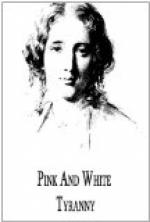We apprehend that the recent storms of tribulation which have beat upon those fairy islands of fashion may scatter this frail and fanciful population, and send them by shiploads on missions of civilization to our shores; in which case, the bustle and animation and the brilliant display on the old turnpike, spoken of familiarly as the “broad road,” will be somewhat increased.
Grace however managed, by the exercise of a good individual taste, to come out of these shopping conflicts in good order,—a handsome, well-dressed, charming woman, with everybody’s best wishes for, and sympathy in, her happiness.
Lillie was summoned home by urgent messages from her husband, calling her back to take her share in wedding festivities.
She left willingly; for the fact is that her last conversation with her cousin Harry had made the situation as uncomfortable to her as if he had unceremoniously deluged her with a pailful of cold water.
There is a chilly, disagreeable kind of article, called common sense, which is of all things most repulsive and antipathetical to all petted creatures whose life has consisted in flattery. It is the kind of talk which sisters are very apt to hear from brothers, and daughters from fathers and mothers, when fathers and mothers do their duty by them; which sets the world before them as it is, and not as it is painted by flatterers. Those women who prefer the society of gentlemen, and who have the faculty of bewitching their senses, never are in the way of hearing from this cold matter-of-fact region; for them it really does not exist. Every phrase that meets their ear is polished and softened, guarded and delicately turned, till there is not a particle of homely truth left in it. They pass their time in a world of illusions; they demand these illusions of all who approach them, as the sole condition of peace and favor. All gentlemen, by a sort of instinct, recognize the woman who lives by flattery, and give her her portion of meat in due season; and thus some poor women are hopelessly buried, as suicides used to be in Scotland, under a mountain of rubbish, to which each passer-by adds one stone. It is only by some extraordinary power of circumstances that a man can be found to invade the sovereignty of a pretty woman with any disagreeable tidings; or, as Junius says, “to instruct the throne in the language of truth.” Harry was brought up to this point only by such a concurrence of circumstances. He was in love with another woman,—a ready cause for disenchantment. He was in some sort a family connection; and he saw Lillie’s conduct at last, therefore, through the plain, unvarnished medium of common sense. Moreover, he felt a little pinched in his own conscience by the view which Rose seemed to take of his part in the matter, and, manlike, was strengthened in doing his duty by being a little galled and annoyed at the woman whose charms had tempted him into this dilemma. So he talked to Lillie like a brother; or, in other




